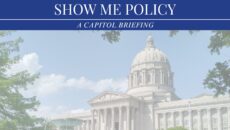Across the U.S., patients are struggling every day to cover the costs of medical bills and prescriptions. While drug prices have skyrocketed, Americans are facing the alarming reality of having to choose between their health and the rest of their expenses. That is no different here in Missouri.
Healthcare spending per person in Missouri grew 30% between 2013 and 2021 to a total $7,892 and resulted in more than 60% of residents in the Show-Me State experiencing a healthcare affordability burden in 2021. For many, this financial pain has been felt at the pharmacy where 30% of Missourians have been forced to cut pills in half, skip doses of medicine, or pass on filling a prescription altogether due to cost considerations. For others, the struggle lies not only in affording the price of care, but in paying for health insurance itself.
Missouri is one of only five states in the country where people with work-based insurance face average premiums and deductibles topping $9,000 a year, a number so high that economists at the Commonwealth Fund consider even the average middle-income earner in the Show-Me State underinsured. For hundreds of thousands of other residents in our state, these costs are simply out of reach. Today 9.4% of Missourians are without any health coverage whatsoever, which has left residents vulnerable to unexpected medical bills and the high costs of prescription drugs.
Unfortunately, efforts may now be underway in Washington to undermine a program put in place to safeguard access to lifesaving pharmaceuticals and health services in our nation’s most vulnerable communities at the very time when it may be needed the most.
Specifically, the 340B Program has allowed for healthcare organizations serving rural, low-income, and uninsured areas to buy discounted pharmaceuticals from drug companies for their patients. Spending less on pharmaceuticals has allowed these healthcare facilities to provide discounted or no-cost drugs as well as deliver more charity care and comprehensive services to their patients.
In a state like Missouri, where 99 of our 115 counties are made up of rural areas and the top 18 counties for poverty rates are all rural, programs like 340B are critical. Missourians in rural areas rely on these local hospitals to provide the critical services they need, but as things stand today one-third of all rural hospitals in the state are at risk of closing. With many of them are struggling to maintain the funding to stay open, this program serves as a crucial lifeline.
Unfortunately, Congress is currently considering legislation that while well intentioned would make it more difficult for hospitals to manage the requirements of the 340B Drug Pricing Program. Under this bill, enrollees in the program could find themselves buried in a new unmanageable mountain of red tape that among other things would obligate them to recertify their eligibility every year. Other changes under consideration would also not only stop additional hospitals from enrolling in 340B, but could also force out hospitals already in the program. Caution should be exercised as such modifications could very well limit lifesaving care to Missourians and Americans across the nation.
A more productive path forward could involve changes to the program that would strengthen enforcement of the original 340B statutes. Efforts are underway by several pharmaceutical companies to convert the program to a back-end rebate program. This would not only increase the burden on the patient and facility with more paperwork, resources, and time commitment but would also force financially vulnerable safety-net hospitals to front the cost of such drugs. A new 340B Administrative Dispute Resolution (ADR) should hopefully offer a pathway to help curtail such disruptive actions, and policymakers should look for ways to expedite its integration into the 340B program.
For the millions of uninsured or underinsured patients in Missouri, the free and discounted drugs and greater access to charity care the 340B program provides is invaluable. The program, which operates at no cost to American taxpayers and accounts for a mere 3.6% of the total drug market, punches above its weight. As Missourians continue to struggle with the escalating costs of medical care, it is important we preserve programs that help counter this concerning trend.

Congressman Billy Long represented Missouri’s 7th congressional district from 2011 to 2023 and previously served on the Committee on Energy and Commerce, Subcommittee on Health.





